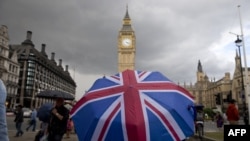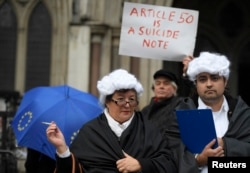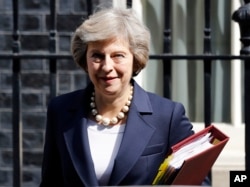Britain’s decision to leave the European Union survived a legal challenge Friday when Northern Ireland’s High Court dismissed arguments that could have prevented Prime Minister Theresa May from beginning the process of exiting the EU.
It was the first court ruling on the Brexit decision, approved by 4 percentage points in a vote in June.
In their suit, a group of local lawmakers claimed the Northern Ireland legislature must be consulted before the British leadership triggers steps to separate from Europe.
Disengaging from the EU will take two years, and the prime minister has said she intends to begin the process by the end of March when she invokes Article 50 of the Lisbon treaty.
“We welcome the court’s judgment this morning and that it agrees we can proceed to trigger Article 50 as planned,” said a spokesman for the British leader Friday.
Good Friday accord
Arguments heard by the Northern Ireland court were based on claims that Brexit could undermine parts of the 1998 Good Friday agreements. The accords ended decades of sectarian violence between nationalist Catholics who wanted reunification of the island with the Republic of Ireland, now a part of the EU, and Protestants who favored British rule.
The peace accords eliminated border controls and guaranteed freedom of movement across the boundary that separates the Republic of Ireland from British-ruled Northern Ireland.
Arguments in the court challenge were based on parts of the accord that say any changes must be with the consent of the people in the Northern Ireland jurisdiction.
In his ruling, high court judge Paul Maguire said it is plain that Britain’s parliament “has retained to itself the ability to legislate for Northern Ireland without the need to resort to any special procedure.”
More challenges likely
“What that means is that the U.K. parliament is sovereign, and until now there is no move in the U.K. parliament to challenge Brexit — currently,” said Keith Boyfield a London economist and commentator on Brexit. “But there will be,” he said.
The countries that form Britain have their own legal systems, and other court challenges against Brexit are pending.
Analysts say Friday’s ruling in Northern Ireland is an important test.
Opposition to June’s decision is getting louder. In a newspaper commentary and radio interview this week, former Prime Minister Tony Blair, a Brexit critic, said “we have to build the capability to mobilize and to organize.”
“The issue is not whether we ignore the will of the people but whether, as information becomes available, and the facts take the place of claims, the will of the people shifts,” Blair wrote the New European newspaper.
Economic turbulence
The drop of the British currency’s value, continuing stock market instability, and the prospect of inflation could bolster the arguments of the opposition and change the minds of some.
But some economists and British leaders say the turbulence will be offset by long-term gains.
A weak pound has helped boost tourism and exports, while a large number of nations have expressed interest in negotiating separate trade deals with Britain. The British economy grew by half a percentage point from July to September. It was a modest figure, but it beat analysts’ forecasts.
In releasing the growth figures, Britain’s Office for National Statistics said “there is little evidence of a pronounced effect in the immediate aftermath of the vote,” allaying concerns among many that Britain might slip into recession in the coming year.
Analysts see little chance that court challenges or politicians’ calls for a new vote will succeed in derailing the Brexit disengagement process that is underway. Leaders, starting with May, say there is no turning back.
But the debate is far from over.
Analysts say continued opposition to Brexit could fuel separatist movements in Northern Ireland and Scotland where the June vote was for remaining in the E.U.
In the case of Northern Ireland, it could mean old matters that appeared to be have been settled by the Good Friday accords could be reignited, and the question of an independent Scotland reawakened.
“You can argue that in the long term, it may well lead to a more united Ireland, and some Scots might feel like they will be better off running their own affairs,” Boyfield said.






